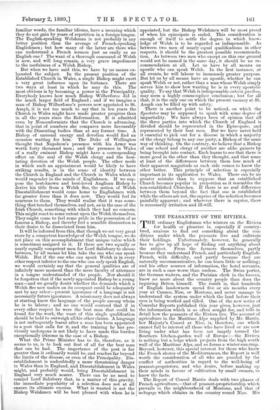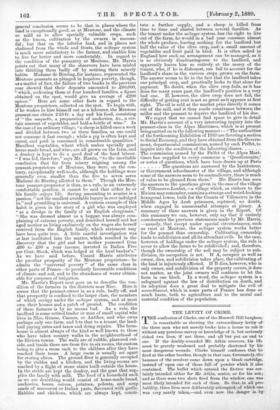THE PEASANTRY OF THE RIVIERA.
THE ordinary Englishman who winters on the Riviera for health or pleasure is, especially if country- bred, anxious to find out something about the con- ditions under which the peasants live and cultivate their holdings. Unfortunately, however, he generally has to give up all hope of finding out anything about the subject. From the farmers themselves, partly because they understand French, and particularly English- French, with difficulty, and partly because they are naturally uncommunicative, he can learn little or nothing; and his other sources of information, the hotel servants, are in such a case worse than useless. The Swiss porter, the German waiters, and the Parisian clerk in the bureau, know no more about the country people than does the inquiring Briton himself. The result is, that hundreds of English landowners spend five or six months every year at Cannes, Nice, or Mentone, and never manage to understand the system under which the land before their eyes is being worked and tilled. One of the new series of Consular Reports published this year gives, however, just the information which is so often sought for, and tells in detail how the peasants of the Riviera live. The account of agriculture in the Maritime Alps supplied by Mr. Harris, her Majesty's Consul at Nice, is, therefore, one which cannot fail to interest all those who have lived or are now living under what has been not inaptly termed the Southern kitchen-garden wall of Europe :—the Riviera is nothing but a ledge which projects from the high south wall of the Maritime Alps, and so forms a winter sun-trap. Beyond, however, this special interest for those who know the French shores of the Mediterranean, the Report is well worth the consideration of all who are puzzled by the conflict of authorities in regard to the well-being of peasant-proprietors, and who desire, before making up their minds in favour of cultivation by small owners, to know the facts.
The Report of Consul Harris deals with two phases of French agriculture,—that of peasant-proprietorship which prevails in the neighbourhood of Mentone, and that of mitayage which obtains in the country round. Nice. His general conclusion seems to be that in places where the land is exceptionally good, as at Mentone, and the cliinate so mild as to allow specially valuable crops, such as the lemon, cultivation by the owners is success- ful;. but that on the inferior land, and in places not sheltered from the winds and, frosts, the melayer system is much more satisfactory to the farmer, and enables him to live far better and more comfortably. In regard to the condition of the peasantry at Mentone, Mr. Harris points out that many of the observers have been misled into thinking them badly of' by noticing their miserly habits. Madame de Borring, for instance, represented the Mentone peasants as plunged in hopeless poverty, though, as a matter of fact, the failure of two banks in the previous year showed that their deposits amounted to £80,000, "which, reckoning them at four hundred families, a figure obtained on the spot, would give an average of £200 apiece." Here are some other facts in regard to the Mentone proprietors, collected on the spot. To begin with, if he wishes to hire himself out as a labourer, the Mentone peasant can obtain 2.28 fr. a day and- his food, consisting of "the moquette, a preparation of anchovies, &c., a cer- tain amount of vegetables, and half-a-bottle of wine." In the case of an ordinary village, "a sheep is killed once a week and divided between two or three families, as one could not consume it fast enough ; while a pig is often kept and cured, and pork is consumed in considerable quantities." Eicellent vegetables, wheat which makes specially good home-made bread, and wine, are all grown on the farm, and a donkey is kept to do a good deal of the hard labour. " I was led, therefore," says Mr. Harris, "to the inevitable conclusion that far from misery reigning among the peasant-proprietors of Mentone, they were, on the con- trary, exceptionally well-to-do, although the holdings were generally even smaller than the five to seven acres Madame de Borring allotted to them." Though the Men- tone peasant-proprietor is thus, as a rule, in an extremely comfortable position, it cannot be said that either he or his family enjoys life. Saving amounting to avarice is a passion, " not the smallest avoidable luxury is ever indulged in," and grumbling is universal. A curious example of this habit is given in the story of a girl who was employed "as a drudge in the family of an English clergyman." "She was dressed almost as a beggar, was always com- plaining of extreme poverty, and described herself and her aged mother as living exclusively on the wages she herself received from the English family, which statement may have been quite true. A little careful investigation was at last instituted into the matter, which resulted in the discovery that the girl and her mother possessed from £60 to -4380 a year income, invested in Italian Five per Cent. Stock, which was lodged at the local banker's." As we have said before, Consul Harris attributes the peculiar prosperity of the Mentone proprietors—he admits the "universal. poverty" of the same class in other parts of France—to peculiarly favourable conditions of climate and soil, and to the abundance of water obtain- able for purposes of irrigation.
Mr. Harris's Report next goes on to describe the con- dition of the farmers in the districts near Nice. Here it seems that the peasant-owner is, as a rule, badly off, and that prosperity is confined to the larger class, the members of which occupy under the metayer system, and at most own their houses and a patch of ground. The condition of these farmers is by, no means bad. As a rule, the landlord is some retired trader or man of small capital who lives in Nice, Grasse, Cannes, or Antibes, and who owns perhaps only one farm, and lets that to a tenant, the land- lord paying rates and taxes and doing repairs. The farm- house is almost always of the kind so well known to those who have taken country walks in the neighbourhood of the Riviera towns. The walls are of rubble, plastered out- side, and inside there are from five to six rooms, the custom being to give a room each to the children after they have reached their teens. A large room is usually set apart for storing olives. The ground floor is generally occupied by the stables and a kitchen, and the living-rooms are reached by a flight of stone stairs built outside the house. In the stable are kept the donkey, and the goat that sup- plies the family with milk. The food of a household such as we are describing would consist of home-made bread, anchovies, beans, onions, potatoes, polenta, and soup made of maccaroni or Italian paste, flavoured with garlic. Rabbits and chickens, which. are always kept, consti- tute a further supply, and a sheep is killed from time to time and shared between several families. As the tenant under the metayer system_has the right to live out of the farm, he would in a bad year consume almost the whole produce, leaving nothing for the landlord but half the value of the olive crop, and a small amount of vegetables and fruit paid in kind. It is often asked in England how such an arrangement can be managed, as it is so obviously disadvantageous to the landlord, and apparently leaves him so entirely at the mercy of the tenant, who, if he is dishonest, can fail to account for the landlord's share in the various crops grown on the farm. The answer seems to lie in the fact that the landlord takes one principal crop, and practically looks to that alone for payment. No doubt, when the olive crop fails, as it has done for many years past, the landlord's position is a very bad one. If, however, the olive crop does not fail, the difficulty of getting rent is not so great as it appears at first sight. The oil is sold at the market price directly it comes out of the mill, and it thus needs connivance between the miller and the peasant to deprive the landlord of his due.
We regret that we cannot find space to give in detail Mr. Harris's account of a very interesting inquiry into the peasant-class in the Alpes Maritimes, which is at present being carried on in the following manner:—" The authorities of the forthcoming Exhibition of 1889 are devoting a section to Social Economy, and they, have obtained from the Govern; ment, departmental commissions, named by each Prefet, to inquire into the condition of the labouring classes The commission named by the Pr4fet of the Alpes Mari- times has supplied to every commune a Questionnaire,' or series of questions, which have been drawn up at Paris The questions are answered by the Instituteur, - or Government schoolmaster of the village, and although some of the answers seem to be contradictory, there is much of value to be gleaned from them." Mr. Harris has seen the answers to the questions given in the case of the village of Villeneuve-Loubet,—a village which, as visitors to the- Riviera may remember, contains a strange and weird-looking hexagonal tower, built for the Counts of Villeneuve in the Middle Ages by Arab prisoners, captured, no doubt, when engaged in unsuccessful attempts at piracy. A summary of these answers is given in the Report. Of this summary we can, however, only say that it entirely corroborates the previous statements made by Mr. Harris, —namely, that except under special circumstances, such as exist at Mentone, the mitayer system works better for the peasant than ownership. Cultivating ownership leads to subdivision and all its attendant evils. In the case, however, of heldings under the metayer system, the rule is never to allow the farms to be subdivided ; and, therefore, though the ownership of the soil may be subject to sub- division, its occupation is not. If A, occupier as well as owner, dies, and subdivision takes place, the cultivating of the land is injuriously affected. If B dies, however, who is only owner, and subdivision of the property occurs, it does not matter, as the joint owners will continue to let the farm in one block. In a word, the metayer system is a. safeguard against the law of distribution on death, and its adoption does a great deal to mitigate the evil of morcellement, which in some parts of France has done so much harm, both to agriculture and to the moral and material condition of the population.



































 Previous page
Previous page